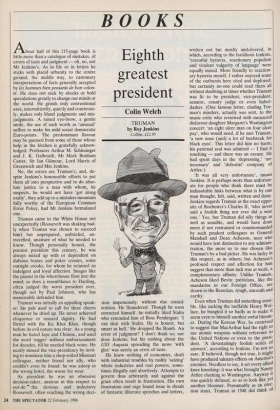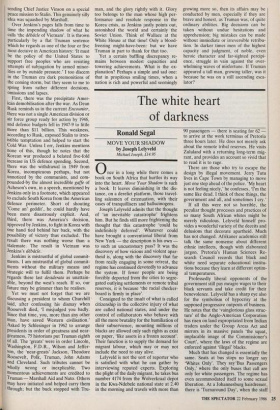BOOKS
Eighth greatest president
Colin Welch
TRUMAN by Roy Jenkins
Collins, £12.95
About half of this 215-page book is little more than a catalogue of mistakes, of errors of taste and judgment — oh, no, not Mr Jenkins's. As in life so in letters he sticks with placid urbanity to the centre ground, the middle way, to customary interpretations of facts generally accepted by les hommes bien pensants de bon volon- t é. He does not seek by shocks or bold speculations greatly to change our minds or the world. He grinds only conventional axes, intermittently, quietly and courteous- ly, makes only bland judgments and mis- judgments. A raised eye-brow, a gentle smile, the use of such words as 'unusual' suffice to make his mild social democratic Euro-points. The predominant flavour may be guessed from some of those whose help in the kitchen is gratefully acknow- ledged: Professors Arthur M. Schlesinger and J. K. Galbraith, Mr Mark Bonham Carter, Sir Ian Gilmour, Lord Harris of Greenwich and Mrs Jenkins.
No, the errors are Truman's; and, de- spite Jenkins's honourable efforts to put them all into perspective and to do abso- lute justice to a man with whom, he suspects, he would not have 'got along easily', they add up to a mistakes mountain fully worthy of the European Common Error Policy, had Mr Jenkins formulated one.
Truman came to the White House not unexpectedly (Roosevelt was shaking bad- ly when Truman was chosen to succeed him) but unprepared, unbriefed, un- travelled, unaware of what he needed to know. Though personally honest, the poorest president this century, he was always mixed up with or dependent on dubious bosses and poker cronies, some outright crooks, for whom he retained an indulgent and loyal affection. Images like the pianist in the whorehouse float into the mind; so does a resemblance to Harding, often judged the worst president ever, though not by Paul Johnson, who has memorably defended him.
Truman was initially an appalling speak- er: his pals used to call for three cheers whenever he dried up. He never achieved eloquence or assured dignity. He had flirted with the Ku Klux Klan, though before its evil nature was clear. As a young man he hated Japs and Chinese, and used the word 'nigger' without embarrassment for decades, till he needed black votes. He nearly missed the vice-presidency by invit- ing to nominate him a shop-soiled Missouri colleague, neither friend nor ally, who couldn't even be found: he was asleep in the wrong hotel, the worse for wear.
As president he was an obsessive decision-taker, anxious in this respect to out-do — the devious and indecisive Roosevelt, often reaching the wrong deci- sion impetuously, without due consid- eration. He floundered. Though he soon corrected himself, he initially liked Stalin who reminded him of Boss Pendergast: 'I can deal with Stalin. He is honest, but smart as hell.' He dropped the Bomb. An error of judgment? I don't think so; nor does Jenkins; but his rushing about the USS Augusta spreading the news 'with glee' was surely an error of taste.
He knew nothing of economics, dealt with industrial troubles by rashly 'seizing' whole industries and vast powers, some- times illegally and abortively. Attempts to govern thus arbitrarily and against the grain often result in frustration. His own frustration and rage found issue in shoals of fantastic illiterate speeches and letters, written out but mostly undelivered, in which, according to the fastidious Jenkins, `resentful hysteria, reactionary populism and virulent vulgarity of language' were equally mixed. More friendly to reaction- ary hysteria myself, I rather enjoyed some of the outbursts here cited and deplored; but certainly no-one could read them all without doubting at times whether Truman was fit to be president, vice-president, senator, county judge or even haber- dasher. (One famous letter, eluding Tru- man's minders, actually was sent, to the music critic who reviewed with measured disfavour daughter Margaret's Washington concert: 'an eight ulcer man on four ulcer pay', who would need, if he met Truman, `a new nose (and) a lot of beefsteak for black eyes'. This letter did him no harm; his paternal zeal was admired — I find it touching — and there was an excuse. He had spent days in the `depressing,' un- necessary' and 'defeatist' company of Attlee.) `It was all very unfortunate', muses Jenkins. It is perhaps more than unfortun- ate for people who think there must be indissoluble links between what is by one man thought, felt, said, written and done. Jenkins regards Truman as the exact oppo- site of Rochester's Charles II, 'who never said a foolish thing nor ever did a wise one.' Yes, but Truman did silly things as well as sensible, and would have done more if not restrained or countermanded by such prudent colleagues as General Marshall and Dean Acheson, men who would have lent distinction to any adminis- tration, the more so to one chosen like Truman's by a bad picker. He was lucky in this respect, as in others; but Acheson's profound respect and affection for him suggest that more than luck was at work, a complementary affinity. Unlike Truman, Acheson liked Bevin: patricians, like the mandarins in our Foreign Office, are drawn to the Beoetian, rough, uncouth and earthy.
Even when Truman did something sensi- ble, like sacking the ineffable Henry Wal- lace, he bungled it so badly as to make it seem even to himself another awful bloom- er. During the Korean War, he contrived to suggest that MacArthur had the right to use atomic weapons without reference to the United Nations or even to the presi- dent. 'A devastatingly foolish series of answers', according to Jenkins. I'm not so sure. If believed, though not true, it might have produced salutary effects on America's enemies. Needless to say, it set every allied knee knocking: it was what brought Nanny Attlee clucking to Washington. Anyway It was quickly defused, so as to look like yet another bloomer. Presumably as an elec- tion stunt, Truman in 1948 did think of sending Chief Justice Vinson on a special peace mission to Stalin. This genuinely silly idea was squashed by Marshall.
Over Jenkins's pages falls from time to time the impending shadow of what he calls 'the debacle of Vietnam'. It is thrown particularly by a flat Truman sentence which he regards as one of the four or five most decisive in American history: 'It must be the policy of the United States to support free peoples who are resisting attempts of subjugation by armed minor- ities or by outside pressure.' I too discern in the Truman era dark premonitions of the coming storm, but they seem to me to spring from rather different decisions, omissions and lapses.
First, there was the precipitate Amer- ican demobilisation after the war. As Dean Rusk reminds us in the current Encounter, there was not a single American division or air force group ready for action by 1946, and defence budgets fell in 1947-9 to little more than $11 billion. This weakness, according to Rusk, exposed Stalin to irres- istible temptation and helped to start the Cold War. Unless I err, Jenkins mentions none of this, though he notes that the Korean war produced a belated five-fold increase in US defence spending. Second, there was the withdrawal in 1949 from Korea, inconspicuous perhaps, but not unnoticed by the communists, and com- pounded•by the almost incredible gaffe of Acheson's own, in a speech, mentioned by Jenkins only in a footnote, which appeared to exclude South Korea from the American defence perimeter. Short of shouting `Come an' geddit', he could hardly have been more disastrously explicit. And, third, there was America's decision, approved by Jenkins, to fight in Korea with one hand tied behind her back, with the Possibility of victory thus excluded. The result there was nothing worse than a stalemate. The result in Vietnam was Jenkins's debacle.
Jenkins is mistrustful of global commit- ments. I am mistrustful of global commit- ments without the military means and strategic will to fulfil them. Perhaps he regards these last desiderata as unattain- able, beyond the west's reach. If so, our future may be grimmer than he realises.
Yet we must not forget that we are discussing a president to whom Churchill said, after confessing his dismay when Roosevelt died, 'I misjudged you badly. Since that time, you, more than any other man, have saved Western civilisation.'
Asked by Schlesinger in 1962 to arrange presidents in order of greatness and near- greatness, 75 historians put Truman eighth of all. The 'greats' were in order Lincoln, Washington, F.D.R., Wilson and Jeffer- son, the 'near-greats' Jackson, Theodore Roosevelt, Polk, Truman, John Adams and Cleveland. Such tributes cannot be Wholly wrong or inexplicable. Two Momentous achievements are credited to Truman — Marshall Aid and Nato. Others May have initiated and helped carry them through; but the buck stopped with Tru- man, and the glory rightly with it. Glory too belongs to the man whose high per- formance and resolute response in the Korea crisis, as Jenkins justly points out, astonished the world and certainly the Soviet Union. Think of Wallace at the White House at that time! Only a blood- freezing might-have-been: but we have Truman in part to thank for that too.
Yet a certain baffling discrepancy re- mains between modest capacities and towering achievements. What is the ex- planation? Perhaps a simple and sad one: that in propitious smiling times, when a nation is rich and powerful and seemingly growing more so, then its affairs may be conducted by men, especially if they are brave and honest, as Truman was, of quite ordinary abilities. Big decisions can be taken without undue hesitations and apprehension; big mistakes can be made without immediate or irreversible retribu- tion. In darker times men of the highest capacity and judgment, of noble, even heroic character and far-sighted percipi- ence, struggle in vain against the over- whelming waves of misfortune. If Truman appeared a tall man, growing taller, was it because he was on a still ascending esca- lator?















































 Previous page
Previous page